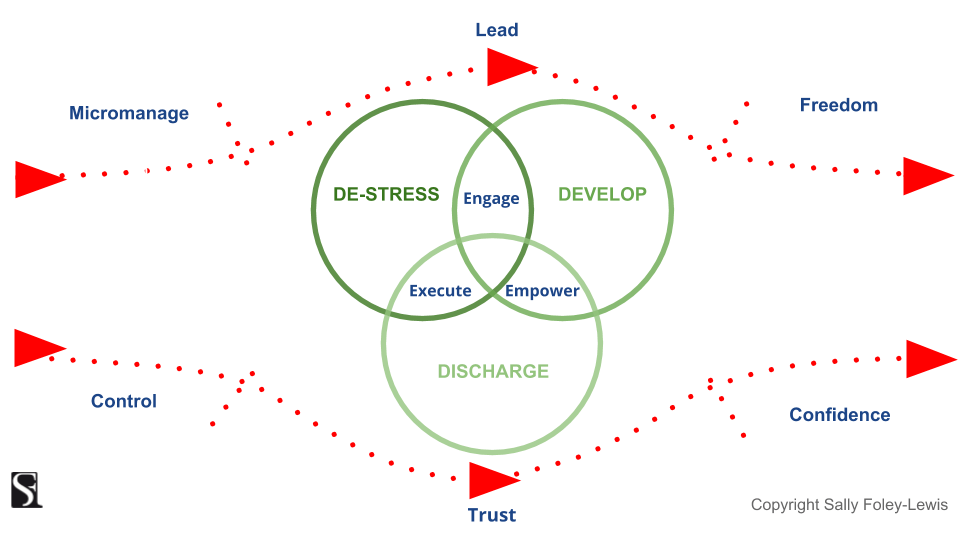Steve was on the verge of being put into performance management because the management of his team was not going well. Steve couldn’t understand why his team became unengaged when he was promoted into the management position. Results were average, the team was hitting their KPIs but nothing about the team performance was outstanding. Everyday Steve was in first and out last. He was working harder than anyone of his peers to support his team but was not getting the results he was striving for.
When Steve’s boss would meet with him, Steve often left the meeting deflated and confused. The effort going in did not match his and his team’s results. His boss would offer very generalised suggestions:
-
- “You need to work your team out.”
- “Motivate them.”
- “Delegate more.”
Steve understood what his boss was saying but didn’t know how to do or implement these. He didn’t want to make the situation for himself any worse by asking his boss how. In Steve’s mind, if he asked he would be seen as incompetent so Steve would leave his boss’ office feeling more stressed and with no clue what to do.
Less is more is what Steve was missing.
Steve would do all the planning, scheduling, deciding for the work of the whole team. Steve thought that if he covered all these aspects of the work he’d be helping his team to get on with the work. While well intended, Steve was excluding his team, he was preventing his team from gaining a sense of ownership early so they were more engaged and invested in their work. When the work was underway Steve was often seen a controlling and micromanaging because he created an environment where he had to work much harder to get the team to perform.
When managers micromanage and maintain strict control over their work and the work of their team they increase the risk of suffocating everyone and everything. The more practice managers have with delegating, the result is greater levels of trust, confidence and a sense of freedom within their role and amongst the team. Figure one lays this out in a visual format for you:
Figure 1: Delegating and Its Benefits

When you do delegate successfully, you have the opportunity to develop your people, discharge tasks that you no longer should be doing. This de-stresses your environment because delegating well means that, collectively, you and the team are executing the work and through the delegation process you and the team are more engaged and empowered.
Managers who have a handle on delegating often report benefits, such as:
- There’s more time to do more important work
- There’s more time to do more relevant work
- There’s more time to think
- Work can carry on during a manager’s absence: no bottlenecking of work and decisions
- Succession planning is supported because delegating prepares employees for higher duties
- The manager gains a reputation as a discerning, trusting delegator who develops their people
Employees also report how much better work is when delegating well has been implemented:
- New skills can be developed
- New ideas can be explored
- Increased productivity through improved motivation and engagement
- Increased productivity through the allocation of tasks across a team
- Less frustration and delays due to bottlenecking, i.e. waiting for decisions
- Career progression
The flow-on effects of these benefits are felt at the organisational level too. Such as:
- Increased productivity
- Decreased human resourcing costs
- Employer of choice reputation
- Knowledge stays within the organisation longer as the right staff stay longer
- Succession planning is easier with greater potential for internal hiring
Whether you are an entrepreneur who hires only a few employees, outsource work or you’re a manager in a large organisation, delegation is an essential skill for success. According to a study conducted by Gallup¹, looking at CEOs with high delegator talent generated 33% greater revenue than those with lower levels of delegating skills.
With all these benefits, delegating is still one of the most under-utilised tools in a manager’s skills toolkit. According to a study conducted by the Institute for Corporate Productivity², 46% of the 332 polled companies are concerned with their workers delegation skills, yet only 28% conduct delegation training.
If this resonates with you, and you can see your management team needs to build their delegation skills, buy them a copy of the book DELEGATE, or please do reach out to organise a workshop: sally@sallyfoleylewis.com. (Yep, a shameless plug!)
In a video highlighting the competitive advantage of delegating, Gail Thompson³ reported that 53% of business owners believe they can grow their business by more than 20% if they delegate only 10% of their workload to someone else.
With all other concerns taken care of, what would be your 10% workload that you would delegate?
Let me know your thoughts…
……………..
Notes:
- 2013 study conducted by Gallup. Results found in Delegating: A Huge Management Challenge for Entrepreneurs.
- Institute for Corporate Productivity (i4cp) in conjunction with HR.com conducted the Time Management Practitioner Consensus Survey in June 2007. Source: https://www.i4cp.com/news/2007/06/26/you-want-it-when
- https://www.youtube.com/watch?v=2-m90oOwZdM&feature=youtu.be linked in https://www.inc.com/peter-economy/delegate-for-competitive-advantage.html




